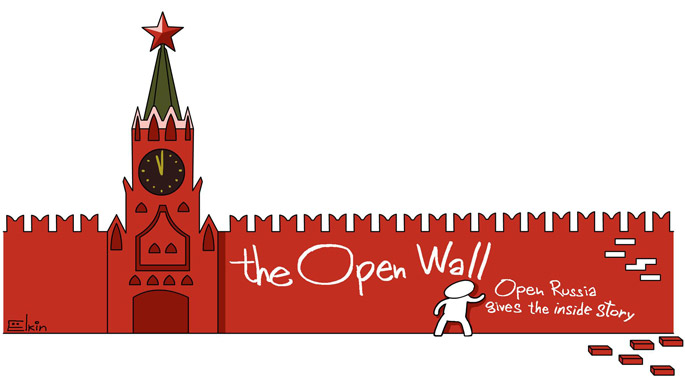Oysters don’t agree with everybody
Oysters don’t agree with everybody
There’s no “r” in the month of May, but who knows if that’s why the Kremlin was so upset at RBC’s reporting of plans to set up an oyster farm next to “Putin’s Palace.”

Who would have thought that a story about oysters would have brought down a billionaire, his independent media group, and ignited a flurry of outrage in the Western papers about yet another attack by the Putin regime on a free press. Mikhail Prokhorov’s RBC media empire is certainly being emasculated, but what about the oysters that caused the upset?
A company called Southern Citadel has been granted a 1000-hectare area of sea, for the farming of oysters and mussels. The farm is off Cape Idokopas near Gelendzhik on the Russian Riviera, right by the so-called “Putin Palace.” The owner of Southern Citadel, one Aleksey Vasilyuk, is a former employee of the Complex company, which manages the palace.
The palace itself is hard to miss – for anybody with a drone and a camera – but who actually owns it is a moot point. The documents point to the usual Putin circle, including co-owner of Bank Rossiya Nikolai Shamalov (whose son is married to one of Putin’s two daughters), who “sold” it for $350 million in the spring of 2011 to Alexander Ponomaryenko, former co-owner of the Novorossiisk Commercial Sea Port. Why exactly he should require such a palace, complete with imperial Russian double eagles on the gates, nobody is saying.

Land registry documents show that Complex does indeed own the Putin Palace, but who owns Complex? David Cameron, tireless offshore campaigner that he is, might be interested to know that Complex belongs to an offshore company called Savoyan Investment Limited registered in the British Virgin Islands, whose beneficiaries, of course, are unknown.
Back to Southern Citadel, which, in April, paid 304,200 roubles ($4560) and 337,000 ($5052) roubles for the two fish farming lots, and was granted rights of use for 25 years. That sounds like an amazingly good deal to us.
One month earlier, Southern Citadel had won another auction for other areas of the sea near Idokopas, successfully bidding for two lots, with a total area of 422.10 hectares, which were designated solely for the farming of mussels and oysters. The company paid 2,360,000 roubles ($35,376).

So the total area of the plots acquired by Southern Citadel is 966.9 hectares, on the shoreline from the village of Divnomorskoye right down to Cape Idokopas, where the Putin Palace stands.
The general director and sole owner of Southern Citadel (only established in July 2015), is Aleksey Vasilyuk. When asked by RBC about his good luck, he confirmed that he had been the successful bidder at the auction, but refrained from commenting on the project for which the lots were acquired, on the grounds that it was commercially sensitive information. Which is not surprising given the money he is likely to make.
Southern Citadel will be farming oysters and mussels (minimum production volume 263.3 tonnes) and also red-lipped mullet, white and Russian sturgeon (minimum production volume 12.7 tonnes). This is not the best use of natural resources. Alexander Fomin, president of the All Russian Association of Fish Farms and Exporters, considers that it would have been better to organise the plantations for growing only mussels and oysters in this part of the sea: “The organising costs would not have been enormous and there is a demand for it.” To his mind, some hundreds of millions of roubles could have been invested and the payback period would have been 5-7 years. Perhaps Bank Rossiya will lend Vasilyuk whatever he needs, at those favourable rates we saw in the Panama Papers.
Sanctions are also playing a role in this fishy business. Seafood from the EU, the main supplier of oysters and mussels to the Russian market, was on the August 2014 list of items banned by the Kremlin, for import to Russia. But in June 2015, right about the time that talks were going on about fish farming close to the Putin Palace, the government lifted the sanctions from young trout, oysters and mussels, saying that this was necessary for the development of a native industry. Whenever the phrase “import substitution” is bandied around, you can be certain that “profit” is not far behind.
Vitaly Kornev, president of the Association of Fish Processors and Traders, assesses the consumption of shellfish in Russia in 2015 at 5,800 tonnes, most of which (5,500 tonnes) was imported. The Russian Fisheries Agency told RBC that in 2015, 30 tonnes of oysters were raised, and in 2016 the figure is projected to be 50 tonnes. In other words, the potential market for Russian oysters is huge.
Aleksey Vasilyuk certainly got his timing right …
But perhaps this tale is not only about oysters. Look at the map of where that fish farm is situated, and it encircles the Putin Palace. Yevgeny Korchago, president of law firm Starinsky, Korchago and Partners, points out that acquiring and managing areas of the sea could also be linked with the owner’s desire to limit access to his land. “It’s actually the only legal way of preventing access from the sea. With the necessary permissions, the company can guarantee that no vessels will be able to come anywhere near. It’s not difficult to get hold of a document showing that boats, launches etc can damage business, and kill young mussels or oysters.”
And that’s the thing with oysters, as RBC found out to its cost: some people love them, but they don’t agree with everybody.




